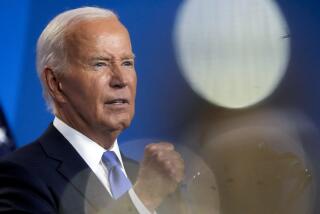The fierce fight for no delegates
MIAMI — A smiling Hillary Rodham Clinton waved from the front page of the Miami Herald on Monday after an evening of fundraising in Florida. The image of Barack Obama flickered on TV screens across the state, from the Panhandle to the high-rises lining South Florida’s Biscayne Bay.
But don’t call it campaigning. That is forbidden under a pledge the White House hopefuls signed back when Florida threatened to encroach on Iowa’s and New Hampshire’s privileged early spots on the presidential nominating calendar.
The result is an odd but intense competition over not just votes but, perhaps more significant, how to interpret the results of today’s Democratic primary -- which will reward precisely zero delegates.
Clinton, who plans a visit after the polls close, has trumpeted Florida’s importance, especially since Obama walloped her Saturday in the South Carolina primary. She has consistently led in polls here and is being boosted by a get-out-the-vote effort coordinated by friends in organized labor.
“I want the voters in Florida to know that I hear them, that I deeply care about their problems,” the senator from New York told reporters Sunday before flying to the Sunshine State for three closed-door fundraisers. “They have all the problems of a fast-growing state with everything that represents.”
Obama is downplaying Florida’s significance, at least in the Democratic nominating fight. The state -- which introduced “butterfly ballot” and “hanging chad” into the nation’s popular lexicon -- is once again expected to be a political battleground in the fall.
“All of us agreed not to campaign there,” the senator from Illinois said Sunday on ABC News’ “This Week with George Stephanopoulos.” “So, you know, as I said before, when I tell people I’m going to do something or not do something, I try to stick to it. And that’s what I’m going to do with respect to Florida.”
The quasi-boycott has apparently done little, however, to dampen the enthusiasm of the state’s Democrats. By Monday, nearly 450,000 absentee and early ballots had been cast -- more than four times the number four years ago -- though at least some of that interest may be tied to a hotly contested property-tax measure on the state ballot.
“That says something about the desire of Floridians to vote and make their voices heard,” said Howard Wolfson, a top Clinton strategist. A non-event, scoffed Obama’s campaign manager, David Plouffe. (But the Obama camp couldn’t resist inflating expectations for Clinton’s showing. “She’ll win by 40, 50, 60 points,” said Obama spokesman Bill Burton. “She’ll get the same number of delegates: Zero.”)
Even as they disputed Florida’s significance, both sides denied surreptitiously campaigning in violation of the pledge.
The Clinton campaign pointed out that fundraising behind closed doors was expressly permitted.
Strategists for Obama said his 60-second spot, which began airing last week, is part of a national TV buy, running on cable networks in 49 states besides Florida.
Former Sen. John Edwards of North Carolina, who is also on the Florida ballot, stayed out of the state and steered clear of the back-and-forth.
Democrats have the Florida Legislature to thank for their uncomfortable situation.
Frustrated over the enormous influence of smaller states, Republicans last year pushed through a bill establishing today’s primary date, even though it ignored the voting guidelines set by the two major parties. In response, the Democratic National Committee voted to strip Florida of its delegates to the party’s national nominating convention. The GOP punished Florida by taking away half its delegates.
Undeterred, the leading Republican presidential candidates have campaigned across the state virtually nonstop for the past nine days. Florida now promises to stamp one of them -- most likely Sen. John McCain of Arizona or former Massachusetts Gov. Mitt Romney -- as the favorite for the party’s nomination.
But the no-campaign pledge, pushed by Democrats in earlier-voting states, rendered its ethnic enclaves and stucco suburbs off-limits to the party’s presidential hopefuls.
Steve and Tracie Fitzgerald, a Florida couple in their 40s, had to settle for seeing former New York City Mayor Rudolph W. Giuliani -- a Republican -- during a stop Sunday at Ron Jon Surf Shop in Cocoa Beach.
Steve, an independent, and Tracie, a Democrat, expressed disappointment at the absence of Democratic contenders. “People want their views known,” Steve Fitzgerald said.
However, the eventual Democratic winner is expected to override the national party’s action in time for this summer’s nominating convention. That would enable Florida to seat its full complement of 210 delegates and 31 alternates -- and eliminate any hard feelings as the Democrats fight to carry the state in the fall.
“I’ve never seen a reporter standing in a cornfield in November saying, ‘It all comes down to Iowa.’ Nobody cares what happens in Iowa,” said Joe Garcia, chairman of the Democratic Party in Miami-Dade County. “With a woman or an African American at the top of the ticket, show me another Southern state they’re going to carry, except Florida. We’re going to see a lot of them from the end of February on.”
Times staff writers Louise Roug and Peter Nicholas contributed to this report.
More to Read
Get the L.A. Times Politics newsletter
Deeply reported insights into legislation, politics and policy from Sacramento, Washington and beyond. In your inbox three times per week.
You may occasionally receive promotional content from the Los Angeles Times.











